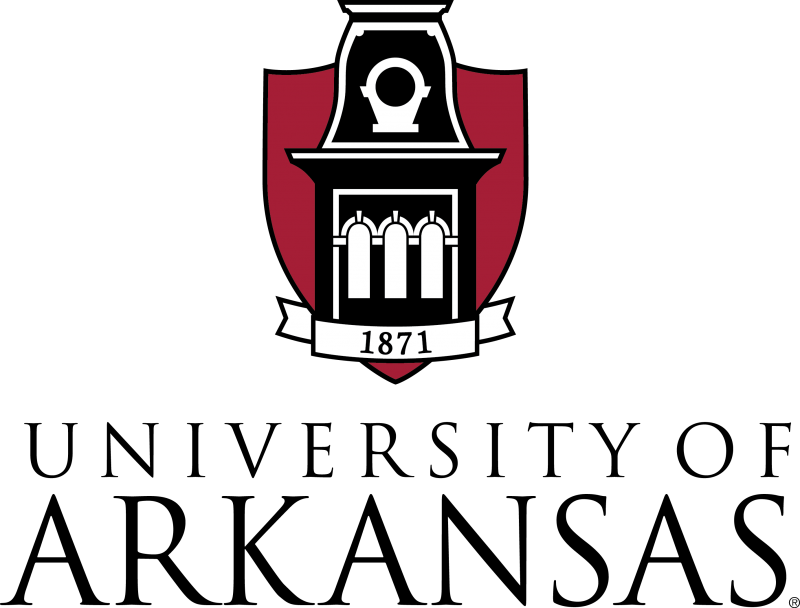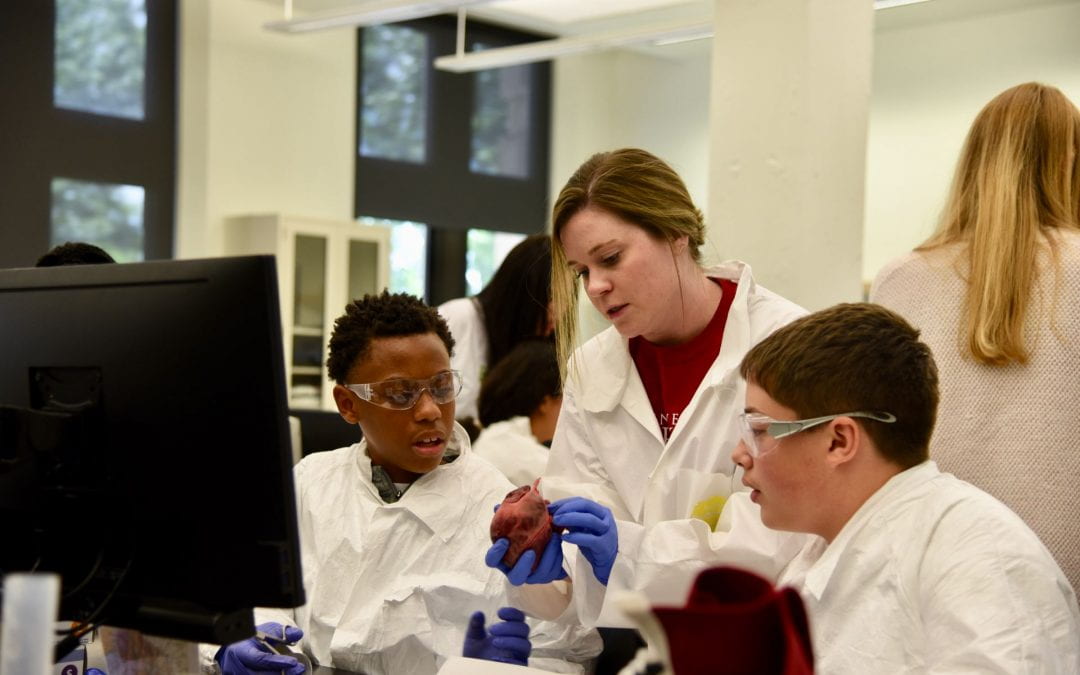Pictured above:Megan Laughlin, a doctoral student in biomedical engineering, helps campers examine a pig heart during the 2019 camp. The pig hearts mimic the structure of the human heart.
MORE THAN A DOZEN STUDENTS from Dumas and Gould made the trip to the University of Arkansas over the summer for a hands-on look at the world of biomedicine, including the fields of biological science, biomedical engineering, exercise science and more.
The program, called Biomedical Research Camp, is aimed at recruiting more diverse students to pursue science, technology, engineering and math career paths.
The camp is in its third year, and this year featured a wide range of collaborators across campus, including the College of Engineering, the J. William Fulbright College of Arts and Sciences, the College of Education and Health Professions, Razorback Athletics, the Center for Multicultural and Diversity Education, the Office of Undergraduate Admissions and the Office for Diversity and Inclusion.
The camp was started by Tameka Jennings, a clinical assistant professor of biological sciences in the J. William Fulbright College of Arts and Sciences.
For Jennings, who is from Gould, the camp is a chance to forge a meaningful connection with her hometown.
“There is so much pride in Gould and Dumas,” she said. “I am a native of Gould, and I love my community. I have dreamed of creating this camp since I was in high school — this camp is my dream realized.”
“I have personally visited the schools and am active in my community so the communities understand that the U of A is invested there. I want my family and friends to feel like this is a sincere investment and not some research project. I want the teachers and parents there to know that they’ve done an amazing job with their students.”
Campers visited several University of Arkansas research spaces for a look at the wide field of biomedicine.
The experience was more than simply looking around — campers had an opportunity to conduct their own experiments thanks to volunteers from biological engineering, biological sciences and exercise science. Students visited the Engineering Research Center at the Arkansas Technology Park and dissected a pig heart, examined a frog’s nervous system and participated in exercise physiology labs, among other activities.
“In addition to the biomedical engineering heart lab and Engineering Research Center tour, the students got a broad scope of biomedical research,” Jennings said. Topics included embryology, the nervous system, neurology, medical microbiology, epidemiology, environmental science, oncology and cardiology, all accompanied by experiments and other activities to give campers a hands-on look into those fields.
Tyrone Washington, associate professor of exercise science, led the campers through exercise physiology labs. Washington said the camp was important to him for several reasons.

Tyrone Washington, associate professor of exercise science, leads campers through an activity during the 2018 camp.
“For one, it exposes young black women to the wonders of science in a way that is fun and engaging,” he said. “Second, this camp helps these young women understand that the University of Arkansas is a place that is for them.”
“I had so much fun interacting with these young ladies and exposing them to exercise science. I hope in the future that the camp can be expanded to offer more people of color an opportunity to see just how fun science can be.”
Hanna Jensen, clinical assistant professor of biomedical engineering, led campers in dissecting a pig heart as an introduction to cardiovascular physiology.
She said the camp is an opportunity for campers and volunteers alike.

Hanna Jensen, clinical assistant professor of biomedical engineering, leads students through a lesson about heart physiology as part of the 2019 Biomedical Research Camp. Students from southeast Arkansas learned about a variety of biomedical careers during their visit to campus.
“For us in biomedical engineering, we are deeply committed to recruiting students from underrepresented minorities,” Jensen said. “Studies are clearly indicating that a diverse workplace will benefit everyone in our program, something that we, already a diverse faculty, are keenly aware of. We embraced this opportunity to welcome these high-schoolers to our department and labs.”
“The girls were engaged and a delight to interact with,” she said. “We sure hope to see some familiar faces in our Introduction to Biomedical Engineering course in a few years.”
Jennings said that was the message she hoped to send back to southeast Arkansas.
“I want them to feel that we are there because we know that they are the next generation of STEM and biomedicine professionals,” she said.
Funding for the camp was provided by the Department of Biomedical Engineering, the Department of Biological Sciences and the Office for Diversity and Inclusion.

